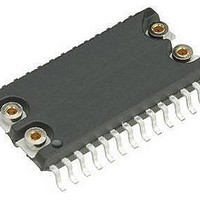M48T86MH1 STMicroelectronics, M48T86MH1 Datasheet - Page 16

M48T86MH1
Manufacturer Part Number
M48T86MH1
Description
Real Time Clock USE 511-M48T86MH1E
Manufacturer
STMicroelectronics
Datasheet
1.M48T86MH1.pdf
(36 pages)
Specifications of M48T86MH1
Function
Clock, Calendar, Interrupt, Alarm
Rtc Memory Size
128 B
Supply Voltage (max)
5.5 V
Supply Voltage (min)
4.5 V
Maximum Operating Temperature
+ 70 C
Minimum Operating Temperature
0 C
Mounting Style
SMD/SMT
Rtc Bus Interface
Multiplexed
Package / Case
SO-28
Time Format
HH:MM:SS, Binary
Date Format
DW:DM:M:Y, Binary
Lead Free Status / RoHS Status
Lead free / RoHS Compliant
Available stocks
Company
Part Number
Manufacturer
Quantity
Price
Company:
Part Number:
M48T86MH1
Manufacturer:
CARTYS
Quantity:
2 585
Part Number:
M48T86MH1
Manufacturer:
ST
Quantity:
20 000
Clock operations
3.3
3.4
16/36
Interrupts
The RTC plus RAM includes three separate, fully automatic sources of interrupt (alarm,
periodic, update-in-progress) available to a processor. The alarm interrupt can be
programmed to occur at rates from once per second to once per day. The periodic interrupt
can be selected from rates of 500 ms to 122 µs. The update-ended interrupt can be used to
indicate that an update cycle has completed.
The processor program can select which interrupts, if any, are going to be used. Three bits
in Register B enable the interrupts. Writing a logic '1' to an interrupt-enable bit (Register B;
Bit 6 = PIE; Bit 5 = AIE; Bit 4 = UIE) permits an interrupt to be initialized when the event
occurs. A '0' in an interrupt-enable bit prohibits the IRQ pin from being asserted from that
interrupt condition. If an interrupt flag is already set when an interrupt is enabled, IRQ is
immediately set at an active level, although the interrupt initiating the event may have
occurred much earlier. As a result, there are cases where the program should clear such
earlier initiated interrupts before first enabling new interrupts.
When an interrupt event occurs, the related flag bit (Register C; Bit 6 = PF; Bit 5 = AF;
Bit 4 = UF) is set to a logic '1.' These flag bits are set independent of the state of the
corresponding enable bit in Register B and can be used in a polling mode without enabling
the corresponding enable bits. The interrupt flag bits are status bits which software can
interrogate as necessary.
When a flag is set, an indication is given to software that an interrupt event has occurred
since the flag bit was last read; however, care should be taken when using the flag bits as all
are cleared each time Register C is read. Double latching is included with Register C so that
bits which are set remain stable throughout the READ cycle. All bits which are set high are
cleared when read. Any new interrupts which are pending during the READ cycle are held
until after the cycle is completed. One, two, or three bits can be set when reading Register
C. Each utilized flag bit should be examined when read to ensure that no interrupts are lost.
The second flag bit usage method is with fully enabled interrupts. When an interrupt flag bit
is set and the corresponding enable bit is also set, the IRQ pin is asserted low. IRQ is
asserted as long as at least one of the three interrupt sources has its flag and enable bits
both set. The IRQF bit (Register C; Bit 7) is a '1' whenever the IRQ pin is being driven low.
Determination that the RTC initiated an interrupt is accomplished by reading Register C. A
logic '1' in the IRQF bit indicates that one or more interrupts have been initiated by the
M48T86. The act of reading Register C clears all active flag bits and the IRQF bit.
Periodic interrupt
The periodic interrupt will cause the IRQ pin to go to an active state from once every 500 ms
to once every 122 µs. This function is separate from the alarm interrupt which can be output
from once per second to once per day. The periodic interrupt rate is selected using the same
Register A bits which select the square wave frequency (see
the Register A bits affects both the square wave frequency and the periodic interrupt output.
However, each function has a separate enable bit in Register B. The periodic interrupt is
enabled by the PIE bit (Register B; Bit 6). The periodic interrupt can be used with software
counters to measure inputs, create output intervals, or await the next needed software
function.
Table 4 on page
18). Changing
M48T86













